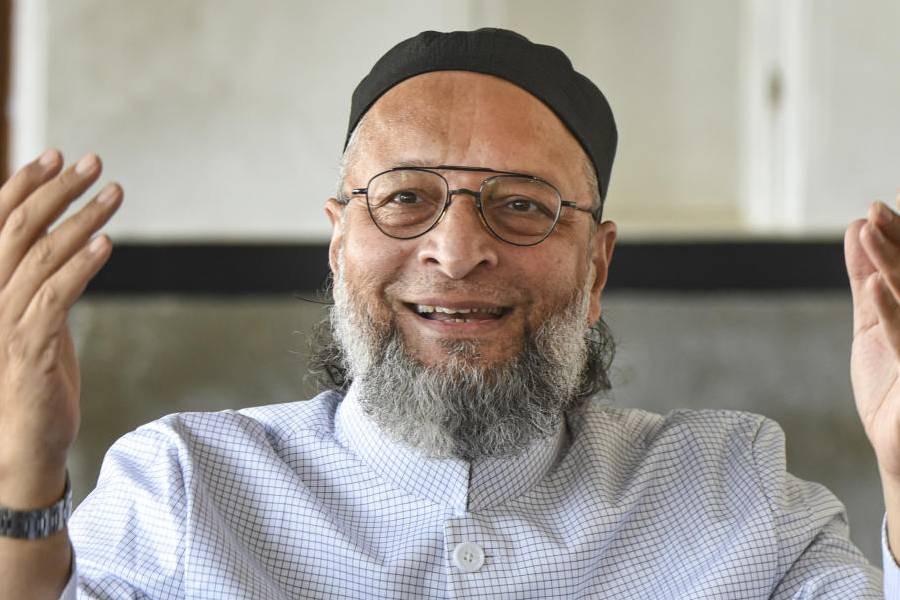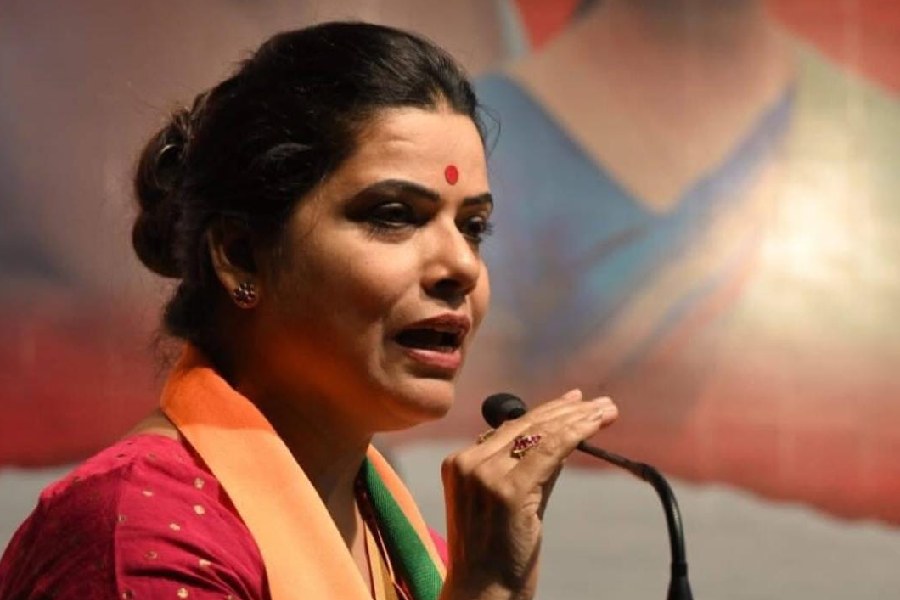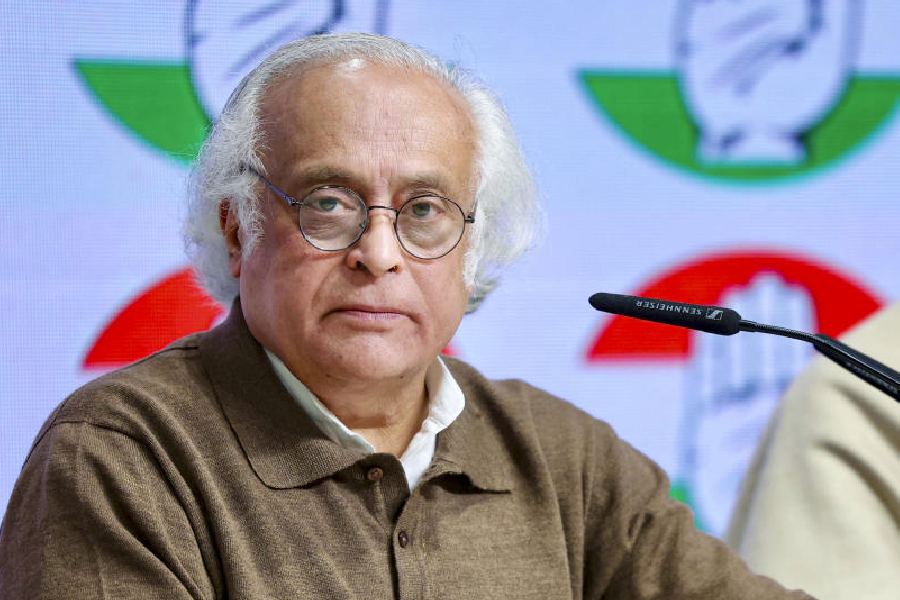.jpg)
A chat with his wife prompted him to write Keepers of the Kalachakra. Author Ashwin Sanghi talks about the making of his latest book, his greatest worry and the spirit of Calcutta on the sidelines of the fifth Kolkata Literature Festival, in association with The Telegraph, at Central Park, Salt Lake. Excerpts from the t2 chat...
Do you think attending literary meets is necessary for a writer’s image?
No. People come to hear you speak because they love your writing, your stories. If you are going to spend so much time doing the literary fest circuit, when will you turn out another book? So one does have to be a little cautious in terms of the number of literature festivals and public appearances that one should go for. Ideally, I would like 90 per cent of my time to be focused on creative endeavour. So while I love engaging with my readers in literary festivals, it has to be limited. I always have a thousand ideas in my head, so how do I get down to writing them?
Do you have your favourite cities?
Calcutta is definitely one of them, partly because you don’t see this level of enthusiasm anywhere for books. Maybe Chennai comes a close second, but Calcutta is right up there. Calcutta, Chennai Bangalore and Pune are places where you see a genuine interest in books and you find a large chunk of people have already read your book before attending a literary interaction. That, I think, is really refreshing.
How often have you been compared to Dan Brown?
Everywhere I go. I am a big fan of Dan — that rhymes... fan of Dan (laughs). My first book The Rozabal Line was inspired by the idea that one could take mythology or theology and connect it with a thriller. But The Rozabal Line is nothing like a Dan Brown. All my writings are different from Dan’s and the comparison is misplaced. But it does not irk me in any way. In fact, I feel happy that I am being compared to an author who has sold 290 million copies!
What is your favourite genre? Mythology, thriller or a bit of both as we see in Keepers of the Kalachakra?
During my growing up years, my grand-uncle would send me a steady stream of books that included Edward Fitzgerald’s The Rubaiyat of Omar Khayyam, Leo Tolstoy’s War and Peace and Paramahansa Yogananda’s Autobiography of a Yogi. My mother gave me paperbacks — Sidney Sheldon, Jeffrey Archer, Irving Wallace, Robert Ludlum, Frederick Forsyth and more. My inspiration comes from the books my grand-uncle gave me but my style comes from what my mother gave me to read. I love to combine both.
People talk of me as a mythological fiction writer but that is untrue. In Keepers of the Kalachakra, there are touches of mythology, history, politics, religion, theology and science. I used mythology to my convenience to be able to tell a story. There are parts of mythology that interest me personally. The most delicious question is ‘what if?’. What if the bridge that once connected India to Lanka existed? What if it was actually built by Ram and his army? What if the Kurukshetra war actually took place and we uncover evidence of it? What if Krishna existed and we have DNA evidence to prove that. Such questions excite me, it’s not just the myth.
Do you love math? Keepers of the Kalachakra is replete with references to math and physics and quantum theory.
(Laughs) Not really. This book was the most difficult one I have written. I studied science till Class XII and then I studied economics. After that, I got an MBA in finance. Being a baniya, accounting, debit, credit are very much a part of my life. But mathematics, physics or chemistry have never been a part of my repertoire. So, for this book I had to spend a lot of time with a friend from IIT. I told him — just think that you are giving me a class called quantum theory 101. And you have to bring me up to date. You tell me what to read and I will read it.
I did not know the first thing about quantum theory. I needed to understand the concepts and co-relate them with a spiritual and philosophical element. That is something I found very challenging.
What made you write Keepers of the Kalachakra?
I was chatting with my wife and I asked her what is real — the life we are leading right now or the seven or eight hours when we drift off to sleep? What if my conversation with you is actually a dream. My wife replied, ‘You know you have got an idea there.’
How long did it take to finish the project?
I started by the end of 2015. The research, weaving, plotting and writing took around two years. Bits of the book, like the prologue, which relate to events that happened later were also written later.
In Keepers… the characters are based in several countries. Do you always write about the places you visit?
You can always visit a location virtually, but what helps is talking to people. A large part of Sialkot Saga is based in Calcutta. Talking to people helped even then. It’s easier to write about places in the present day because anyone can describe them to you. It’s tougher when you write about a place 50 or 100 years ago.
If I throw in a location like Calcutta into my story and if I have a character growing up in the city, there will be some typical questions that will come to my mind. How much my character needed to pay for phuchka in 1953, or where would he have taken a girl out to? So you have to talk to a lot of people to know these small details. The same holds true about Japan, China or some far-off country. My sources of information include reading, the Web and video feeds.
When I was writing The Krishna Key, I visited a lot of places. I realised there was not much stuff available for research. So I went to Dwarka, Somnath and Mathura. But it is not always like that.
What kind of a mindset should a writer have to write an interesting crime fiction or thriller?
A criminal bent of mind maybe (laughs). Jokes apart, there are some people who are very good puzzle-solvers. I was one of them. You give me a jigsaw and I can solve it very quickly. Writing a book is a lot like a jigsaw puzzle. While writing thrillers, I spend a lot of time drawing a picture in detail. Then I take a pair of scissors and cut it up in a thousand pieces. I present to my readers these pieces in a disorganised fashion. But I give them enough opportunities to put the pieces together. It is like a competition between the reader and the writer on who can put the pieces together first.
What about your next book?
I have not zeroed in on a particular plot yet. This book was launched in January and typically there is a phase of three months when I am focused on the marketing aspect of it. I am not shy about that. I normally don’t have a single plot in mind but multiple plots. Currently, I have three distinct ideas and I am trying to find out which one I will work on. Keepers... was a complex combination of science, philosophy and mythology. My next book should be a comparatively straightforward read. I keep swinging between extremities. Keepers... required a lot of mental investment, while Sialkot Saga required much less. The next one will be a far more fluid and easier read.
Which genre is the easiest to write?
When I look at some of my friends who dabble in teen romance, I wonder if I will ever be able to write that. Crime thrillers are more difficult to write in my case as they require plotting and heightening of excitement with every page. How do you amplify the fear? In my Bharat series, the thrill came from the material. In a crime thriller the thrill comes from the fact that there is someone lurking around the door. That is far more difficult to build.
Do you try some tested techniques to hold one’s attention?
Of course. Holding on to the reader’s interest is a big issue. Hitchcock had said the length of a movie is related to the endurance of the human bladder. At some point of time, you have to get up. The same applies to books. Human attention spans are dropping. Shorter chapters are better in crime thrillers.
Should violence be subtle?
The series I wrote with James Patterson is substantially violent. We are living in a world where we are surrounded by violence. My characters are never positive or negative. They are always in a grey zone where they could swing on either side. In my crime thrillers, I present the underbelly of life. So it does not bother me to be gritty.
If you are let loose in Calcutta, where would you go?
I would love to base a story about the world of art in Calcutta next. If I had a day in Calcutta, I would go to the Victoria Memorial and sit under a tree. There is something about the city, its street food, sandesh, the attitude of people that is unique. My experience of Calcutta is limited, but this city grows on you with time. It lends itself to exploration.
Which book will you like to see turned into a film?
The Krishna Key and Chanakya’s Chant are being auctioned for a film and Sialkot Saga is being auctioned for a series. But I would love The Rozabal Line to be turned into a docu-drama. Since the plots in my books are so exciting, who enacts them becomes irrelevant. Except in Chanakya’s Chant, I think Manoj Bajpayee or Ajay Devgn should play Chanakya.
Chandreyee Ghose
The best thriller by an Indian author I have read is... Tell t2@abp.in

.jpg)








